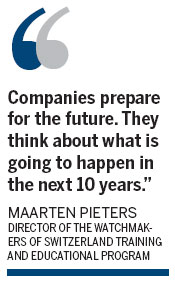Boom time for Swiss watchmakers

Andrew I-Jen Chen swapped a career crunching numbers at French bank BNP Paribas to take up an apprenticeship at one of Switzerland's most prestigious watchmaking schools.
He is one of a growing number of people attracted to a career in horology as Swiss watch firms vie for staff to meet buoyant Asian demand for high-end timepieces and fill the hole left when industry heavyweight Swatch decided to cut the volume of mechanical watch parts it sells to others.
"In banking you just sit there working with numbers that don't mean anything," the 29-year-old from Taiwan said, as he turned a hand lathe to painstakingly cut the tip of an axle, a component used in the balance wheel, which makes a watch tick.
Legislation to tighten the rules on what can be called a Swiss-made product also means that watch companies are ploughing millions into new factories at a time when many Swiss firms are thinking of moving production abroad.
Exports of Swiss timepieces soared 19 percent to a record 19.3 billion Swiss francs ($20.8 billion) last year, rebounding from the 13.2 billion low hit in 2009 in the depths of the financial crisis.
This feat was achieved despite the handbrake of the Swiss franc, which rocketed from one record high to another as investors sought safety from the eurozone's debt troubles, pushing a third of mechanical and electrical engineering firms into the red.
Lessons from past
At the heart of the watch sector's success is a disciplined approach to innovation, says Maarten Pieters, director of the Watchmakers of Switzerland Training and Educational Program, based in Neuchatel.
Discipline and innovation were the industry's progenitors; in 16th-century Geneva, the city's strict Calvinist elders banned citizens from wearing jewelry, among other pleasures, forcing the local jewelers and goldsmiths to find a new craft.
The industry outgrew the city, expanding into a region now known as "Watch Valley", which winds about 200 kilometers from Geneva to Basel.
Over the next four centuries it consolidated its reputation for quality and innovation, traits that have helped it overcome one crisis after another and stay ahead of the crowd. The first wristwatch, quartz watch and water-resistant watch were all Swiss inventions.
"Companies prepare for the future," Pieters said in an interview in the school's kitchen overlooking lake Neuchatel. "They think about what is going to happen in the next 10 years."
They don't always get it right, though.
Caught off guard by the explosion of Japanese quartz watches on the market in the 1970s, about 60,000 jobs evaporated between 1970 and 1984 and nearly 1,000 firms shut up shop.
Lebanese immigrant Nicolas Hayek is widely regarded as saving the industry from cheap Asian imports by launching the colorful plastic Swatch watch in 1983.
"Something very bad happened in the 1970s. It was a lesson learned," Pieters said.
Hiring spree
Now, even with the franc about 30 percent stronger than when the financial crisis hit in 2008, demand for fine pieces is keeping the industry booming and propping up national trade figures.
It is Switzerland's third most important export sector. Its sales abroad rose 18 percent in the first quarter of 2012, helping to keep the overall fall in Swiss exports to just 0.5 percent in real terms.
By contrast, exports in the machinery and electrical engineering industries, the second most important sector, tumbled 10.5 percent, while exports in the paper and graphics industry plummeted 20 percent.
Swatch has pledged to create 500 new jobs in Switzerland this year, while Richemont, the world's second largest luxury goods company, has said it plans to create up to 2,000 jobs over two years.
Richemont said it would invest 100 million francs in a training center near Geneva. It also plans to recruit two-thirds of workers for its new Cartier jewelry production site from France.
Reuters


















